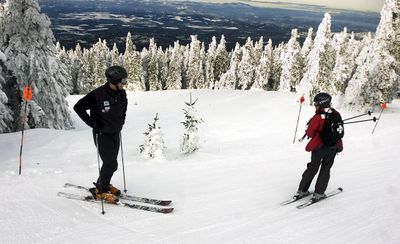Ski resorts dispute bad ratings from group

A group that rates the environmental friendliness of ski areas in the West gave failing grades to two Spokane-area resorts based largely on the resorts’ development plans.
The Ski Area Citizens’ Coalition rated Mt. Spokane Ski and Snowboard Park and 49 Degrees North Mountain Resort among the 10 worst ski resorts for environmental friendliness because of plans to expand “outside the existing area footprint.”
In North Idaho, Schweitzer Mountain Resort received a C and Silver Mountain Ski Resort was given a D by the environmental group.
A 49 Degrees North official pointed out that the coalition discounts resorts’ efforts to balance responsibility to the environment with contribution to the rural economy of northeast Washington.
“The scorecard is weighted heavily against ski area and village development and doesn’t credit resorts’ sustainability initiatives or community involvement,” said Jason Wolther, marketing director for 49 Degrees North.
The Ski Area Citizens’ Coalition reported that 53 of the 83 resorts it reviewed this year boosted their scores, but seven received failing grades.
Coalition research director Hunter Sykes acknowledged that low scores were almost entirely due to an expansion of terrain and real estate development, but he said new development doesn’t automatically mean a low grade. Points awarded for using renewable energy and energy-efficient technologies, for example, can offset deductions for development.
“We do give due credit to what resorts are doing,” Sykes said.
The coalition said Aspen in Colorado, Sundance in Utah, Squaw Valley in California, Mount Bachelor in Oregon and Bogus Basin in Idaho were among a record 18 resorts that got a score of A this year, up from 12 last year.
Sykes, who teaches skiing in Durango, Colo., said resorts should be held accountable for development that could level trees, harm wildlife habitat or disturb water quality.
The coalition scores 49 Degrees North low for ski area expansion, which required clearing 257 acres of forest vegetation in the area formerly known as East Basin. The resort also has been given permission to develop new ski runs on the undeveloped Angel Peak.
The coalition also said 49 Degrees is planning residential and hotel developments as well as new parking.
Wolther said 49 Degrees North’s score was “almost entirely due to an expansion of terrain, both Nordic and alpine, and approved plans for base-area real estate development.”
But he said the resort also has invested in renewable energy and supports the proposed Quartzite Wilderness, a roadless area of the Colville National Forest adjacent to the ski area.
The coalition faults Mt. Spokane’s new Master Development Plan that would allow 333 acres of new terrain, which “may have detrimental impacts” on endangered or threatened wildlife, including Canada lynx, gray wolf , wolverine and Northern Goshawk.
But Mt. Spokane general manager Brad McQuarrie said the resort’s master development plan calls for staying within the existing area it leases from the state.
“In addition, we have designated more than 400 acres we would like to take out of our lease agreement and return to natural forest area,” McQuarrie said.
The state requires the resort to submit a master plan that includes three options: no action, a proposed development plan and a plan for “optimized recreation.”
This third “sky’s the limit” option, which takes into account only recreational considerations without regard to environment or economy, is the one that the coalition mistakenly cites in its scorecard, McQuarrie said.
Furthermore, he said, the coalition’s scorecard for the resort was incomplete, leaving out points for significant environmental initiatives taken by Mt. Spokane.
“They awarded us zero points for most categories,” McQuarrie said.
He cited the master plans’ proposed removal of a lift built in wetlands in the 1960s as one category in which the coalition denied the resort points for conservation.
Had the scorecard been completed, McQuarrie said, Mt. Spokane would have landed between the 70th and 80th percentiles, just below the top 10 ski resorts for environmental friendliness.
Sykes said Mt. Spokane had the opportunity to fill out a questionnaire that would have resulted in the resort scoring in many categories where there was no score.
“Unfortunately, Spokane didn’t bother to respond despite a couple attempts to get them to do so,” he said.
In North Idaho, the coalition faulted Schweitzer for installing a new lift and upgrading its snowmaking equipment, which runs counter to water and energy conservation efforts.
Schweitzer communications manager Jennifer Ekstrom said the resort near Sandpoint was not given the opportunity to update the coalition on recent conservation measures.
Ekstrom said the resort has appointed a committee to improve conservation efforts and has hired an environmental coordinator. The resort has increased recycling, limited use of unrecyclable materials and reduced environmental consumption by 27 percent in August and September.
In addition, Schweitzer has purchased 1,000 megawatt hours’ worth of “green tags” representing wind-generated electricity – enough to power the resort’s three largest ski lifts this winter, Ekstrom said.
The coalition reported that Silver Mountain has added 100 acres of skiable terrain through enhancements in wooded areas, with more expansion planned. The resort also has proposed new real estate development, including a golf course.
Lookout Pass Ski and Recreation Area near the Idaho-Montana border was not rated.